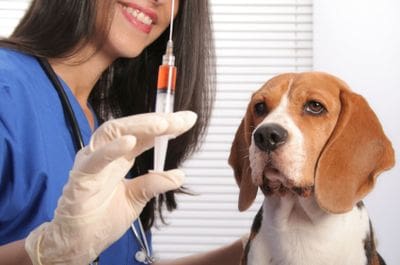Exam & Vaccination
Annual examinations are the best way for us to determine the overall health of a patient and help to detect problems at an early stage before serious illness or complications occur. Early detection and preventative medicine save lives and can save owners the expense of dealing with a medical problem that has been allowed to progress into a more complicated state. Before the exam, the veterinarian will review vaccination status, diet, and parasite control. A thorough physical exam will follow, evaluating dental health, eyes, ears, coat, skin, and body condition. The heart and lungs are auscultated for abnormalities such as heart murmurs, arrhythmias, atypical breathing sounds, or other issues. The doctor will palpate the abdomen and check for changes in the abdominal organs (such as the kidney, liver, bladder, spleen, and intestines). The doctor will also evaluate the urinary system and lymph nodes and look for any changes in the muscles or skeleton as well as the nervous system. Specific blood work and other diagnostic tests are done based on the animal's age and health condition.
Vaccination
Ensure your pet is protected from infectious diseases with our vaccination services. Our vaccine protocols provide your pets with the most immunity possible to prevent them from getting sick, just like most people would want for any family member. We follow vaccination schedules based on the FDA guidelines for the vaccine being used. This assures your pet will receive the immunity they need and minimizes any side effects. Don't let your pet fall victim to the “Vaccines are Bad” movement currently sweeping the country. People have forgotten what it's like to see a child die of Measles, live on a respirator due to Polio, or watch a litter of puppies suffering from explosive diarrhea from Parvo or develop seizures and die from encephalitis due to distemper. We don't see these diseases because we vaccinate them.

Understanding Puppy Vacation
Rabies
A fatal viral infection that causes inflammation of the brain in dogs, cats, humans, and other mammals. It is 100% fatal in animals once symptoms develop. Regular vaccination prevents it. State law requires all dogs, cats, and ferrets over the age of 12 weeks to be vaccinated for rabies at all times.
Preventable Dog Diseases
CANINE DISTEMPER: a viral infection of the gastrointestinal system, respiratory tract, and nervous system. It is treated with hospitalization and supportive care, but is often fatal. It is prevented with regular vaccination **See note below.
CANINE HEPATITIS: a viral infection of the liver that is spread in the feces, urine, blood, saliva, and nasal discharge of infected animals. It is prevented with regular vaccination. **See Note Below
CANINE PARVO VIRUS: a highly contagious viral infection of the intestinal tract that causes vomiting & bloody diarrhea. It is prevented with regular vaccination **See Note Below.
PARAINFLUENZA: a highly contagious viral respiratory infection that is a common cause of infectious tracheobronchitis (i.e., Kennel Cough). It is transmitted through airborne & direct contact with the respiratory secretions of infected dogs. It is prevented with annual vaccination.
* CANINE LEPTOSPIROSIS: a bacterial infection spread in the urine of infected wildlife to both pets and people through contact with urine. The bacteria can also survive in lakes and streams. As Central Florida is the “Land of Lake,” many lakes are contaminated. We recommend all dogs be vaccinated yearly for this potentially fatal disease.
BORDETELLA: an airborne bacterial infection transmitted by exposure to respiratory secretions from coughing dogs. As this can be spread through the air & by direct contact, we recommend yearly vaccination for dogs that will travel outside the home (i.e., dog parks, neighborhood walks, kennels, etc.).
CANINE INFLUENZA: a highly contagious airborne viral respiratory infection caused by a strain of the Avian Flu(H3N2). The virus can survive outside the body for up to 2-days and can be spread by contact with contaminated objects. Dogs have no natural immunity. Once exposed, 80% of dogs will get sick. Dogs are contagious for one week BEFORE symptoms develop, and symptoms can last up to 30 days. Since its arrival in Central Florida in the Spring of 2017, we recommend all dogs be vaccinated yearly.
**NOTE: Some of the newer immunization schedules advocate vaccination once every 3 years, but most vaccines are only FDA-approved for yearly vaccination. We recommend following the vaccine's FDA-approved vaccination schedule.


Preventable Cat Diseases
FELINE RHINOTRACHEITIS: is a very contagious upper respiratory tract infection caused by feline herpes virus, transmitted by direct and indirect contact with saliva or eye/nasal discharge of infected cats. The virus can lay dominant in the cat for weeks to years, periodically causing corneal ulcers, which can lead to blindness. ** See Note Below
FELINE CHLAMYDIA: a bacterial infection that affects the respiratory tract, eyes, gastrointestinal system, and reproduction systems of animals. Cats experience standard upper respiratory tract symptoms, including sneezing, runny nose, watery eyes, coughing, difficulty breathing, lack of appetite (anorexia), fever, and, if left untreated, pneumonia. It is prevented by yearly vaccination, as immunity to bacterial infections is typically short-lived.
FELINE PANLEUKOPENIA: a viral intestinal infection that attacks the digestive tract, causing vomiting & bloody diarrhea. It is transmitted by direct as well as indirect contact with the infectious bodily fluids of a sick cat. ** See Note Below
FELINE CALICI VIRUS: is a highly contagious virus that causes respiratory infections & mouth ulcers. It is transmitted through direct contact with the saliva and respiratory secretions of an infected cat. ** See Note Below
FELINE LEUKEMIA: a viral infection that is the second leading cause of death in cats, killing 85% of persistently infected felines within 3 years of diagnosis. It is transmitted by exposure to an infected cat's saliva, blood, urine, or feces. Because cats are great “escape artists” & likely to get out of the home occasionally, we advised yearly vaccination.
**NOTE: Some of the newer immunization schedules advocate vaccination only once every three years, but most vaccines are only FDA-approved for yearly vaccination. We recommend following the vaccine's FDA-approved vaccination schedule.